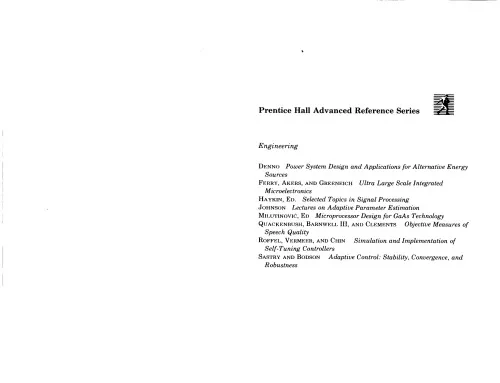Adaptive Control -Stability, Convergence, and Robustness
4.5
Reviews from our users

You Can Ask your questions from this book's AI after Login
Each download or ask from book AI costs 2 points. To earn more free points, please visit the Points Guide Page and complete some valuable actions.Related Refrences:
Introduction to Adaptive Control - Stability, Convergence, and Robustness
"Adaptive Control - Stability, Convergence, and Robustness" is a seminal work authored by S. Sastry and M. Bodson that explores the intricacies of adaptive control systems. Providing a rigorous mathematical foundation, this book delves into stability, convergence, and robustness: the three essential pillars of adaptive control. Designed for researchers, industry professionals, and advanced students, it marries theoretical analysis with practical design principles, making it an indispensable resource for understanding and implementing adaptive control techniques.
Through rich, in-depth discussions, Sastry and Bodson introduce readers to adaptive control methods that compensate effectively for uncertainties in system dynamics. The book is notable for its structured approach, first addressing conceptual principles and then segueing into performance guarantees. With its blend of clarity, depth, and applicability, the book has become a landmark text in the field of control systems engineering.
Detailed Summary of the Book
The book is divided into carefully crafted chapters that systematically address the various aspects of adaptive control:
The text begins with an introduction to the fundamental challenges of control systems and the critical role of adaptation in overcoming these challenges. It then presents an overview of model reference adaptive control (MRAC) and self-tuning regulators (STR), two primary frameworks for adaptive control.
Key concepts such as Lyapunov stability theory, parameter estimation, and persistence of excitation are central to the book’s exposition. The authors rigorously explore stability, convergence, and robustness, demonstrating how adaptive controllers can guarantee performance even in dynamic and uncertain environments. These analyses ensure that readers develop the skills and theoretical insights necessary to design controllers compliant with stability and performance criteria.
The advanced topics discuss robustness in adaptive control, tackling issues like bounded disturbances, unmodeled dynamics, and time-varying parameters. The final sections of the book incorporate practical implementation guidelines, focusing on discrete-time systems and computational aspects, making it a vital handbook for real-world applications.
Key Takeaways
- A comprehensive understanding of fundamental and advanced adaptive control concepts.
- An in-depth exploration of stability, convergence, and robustness, backed by rigorous mathematical proofs.
- Step-by-step guidance to design adaptive controllers that perform under uncertainty and varying conditions.
- An appreciation of practical issues in adaptive control implementation, including computational constraints.
- The theoretical tools to identify and evaluate the limitations of adaptive control systems in real-world scenarios.
Famous Quotes from the Book
"The challenges posed by uncertainty require adaptive mechanisms that are not only stable but also convergence-guaranteed and robust to unpredictable conditions."
"The field of adaptive control must be regarded as an evolving discipline, bridging the gap between theoretical concepts and practical challenges."
Why This Book Matters
"Adaptive Control - Stability, Convergence, and Robustness" is a cornerstone in adaptive control literature. Its significance lies in its ability to address the mathematical and practical challenges inherent in adaptive systems. Unlike many works in this domain, the book successfully incorporates theoretical rigor without alienating practitioners who seek hands-on design strategies.
With the increasing reliance on adaptive control in various engineering fields—ranging from aerospace to robotics and process control—this text serves as a vital guide. It empowers engineers and researchers to create robust, high-performing systems, ensuring reliability in unpredictable environments. The clarity in its exposition and the depth in its analysis make it not just a textbook, but a long-term reference for those shaping the future of adaptive control.
Free Direct Download
You Can Download this book after Login
Accessing books through legal platforms and public libraries not only supports the rights of authors and publishers but also contributes to the sustainability of reading culture. Before downloading, please take a moment to consider these options.
Find this book on other platforms:
WorldCat helps you find books in libraries worldwide.
See ratings, reviews, and discussions on Goodreads.
Find and buy rare or used books on AbeBooks.














